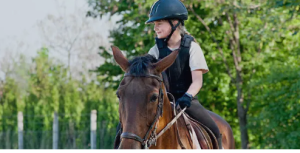When it comes to extracurricular activities, parents often look for experiences that will benefit their children physically, mentally, and emotionally. Equestrian lessons at schools with equestrian facilities, though sometimes overlooked, offer a well-rounded and unique set of advantages. Riding and caring for horses can help children build character, develop physical fitness, and gain valuable life skills. Here are some of the major benefits of equestrian lessons for children.
Physical Development
Horseback riding is a full-body workout. Despite the perception that the horse does most of the work, riding actually engages core muscles, improves balance, and enhances coordination. Children who take equestrian lessons will also develop strength in their legs, back, and arms, as they learn to guide the horse, maintain posture, and react to the animal’s movements.
Beyond the physical demands of riding, barn activities like grooming, feeding, and mucking out stalls also encourage children to stay active. Handling equipment, lifting buckets, and moving around the stable promotes physical fitness while keeping kids engaged in fun and purposeful tasks.
Improved Confidence and Self-Esteem
One of the greatest benefits of riding lessons is the confidence boost that comes with mastering a large, powerful animal. Horses are intelligent and sensitive creatures, and learning to communicate with them effectively can foster a sense of accomplishment. As children advance through riding skills—whether it’s mastering a trot or jumping obstacles—they build confidence in their own abilities.
Moreover, riding often involves overcoming fears or nerves. Many children begin with a healthy respect or even fear of horses. With the guidance of an instructor and the support of a well-trained horse, they learn to manage those feelings and gain confidence in themselves. This sense of achievement can carry over into other areas of life, from school to social situations.
Development of Responsibility
Caring for a horse requires dedication and responsibility. From grooming and feeding to cleaning stalls, children learn that horses rely on them for care and wellbeing. This is a hands-on lesson in responsibility, as young riders must commit time and effort to care for their animal before and after every ride.
Even though most children may not own the horses they ride, their instructors often assign tasks to help foster a sense of responsibility for the animals. These activities also develop a sense of empathy, as kids understand the importance of providing for another living creature’s needs.
Emotional and Mental Health Benefits
Riding can have a calming and therapeutic effect on children. Horses, by nature, are non-judgmental and provide a sense of companionship that children often appreciate. Studies have shown that spending time with animals can reduce stress, lower anxiety levels, and improve overall mental health.
Additionally, equestrian lessons provide children with an opportunity to develop patience and emotional control. Horses can be unpredictable, so riders must stay calm and focused, learning to read the animal’s body language and react with care. These emotional regulation skills are transferable to many areas of life, especially in managing stress or handling conflicts.
Improved Focus and Discipline
Horseback riding requires a high degree of concentration. Riders must be aware of their body positioning, the horse’s movements, the terrain, and any instructions from their coach—all at once. This intense focus helps children develop mental sharpness and attention to detail.
In addition, riding lessons teach children discipline. Mastering riding techniques requires consistent practice, following instructions, and working through challenges. Equestrian sports often have a competitive side, and children learn the importance of setting goals, working towards them, and accepting feedback from their instructors to improve.
Social Skills and Teamwork
Equestrian lessons are usually taught in group settings, giving children the opportunity to meet and socialise with peers who share a similar interest. Working together in the stable, taking turns, and cheering each other on during lessons or competitions help children develop teamwork and camaraderie.
Children also build strong bonds with their instructors and horses, both of which require mutual trust and respect. They learn to communicate effectively, not only with their peers but with their horse, strengthening both their verbal and non-verbal communication skills.
A Connection to Nature
In today’s world of screens and technology, equestrian lessons offer a refreshing chance for children to spend time outdoors. Riding encourages children to appreciate the natural world, from the beauty of the horse itself to the open fields and trails where they ride. Time in nature has been shown to reduce stress and promote wellbeing in children, making riding an ideal activity for those seeking a break from the hustle of modern life.
Equestrian lessons provide children with a wealth of benefits that go beyond just learning how to ride. From physical fitness to mental wellbeing, responsibility, and social skills, horseback riding is an enriching experience that can help children grow in multiple areas of life. By introducing your child to the world of horses, you may just be giving them a lifelong passion that fosters personal growth and wellbeing for years to come.
Note: This is a collaborative post


No Comments